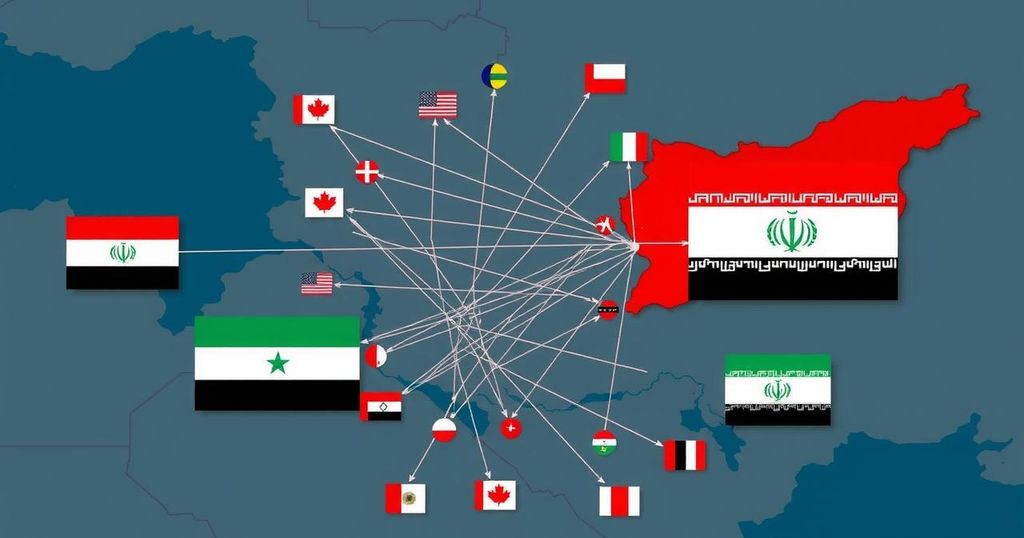Amid escalating opposition attacks and the recent loss of Aleppo, the Syrian regime, led by President Bashar al-Assad, is reaching out to regional allies, including Iran, Iraq, and the UAE, to garner support and reinforce its position. Conversations highlight cooperation in combating terrorism and affirm commitments to Syrian sovereignty, reflecting a strategic effort to consolidate alliances as the regime navigates ongoing challenges in the protracted civil conflict.
The Syrian regime is actively seeking to bolster regional support amid significant setbacks in northern Syria, particularly after the loss of Aleppo to opposition forces. As the regime retains control over western Syria, key territories in the east remain under United States-backed Syrian Democratic Forces, while Turkey governs the north. The situation has become increasingly precarious for the Assad administration, prompting outreach to allies including Russia, Iran, Iraq, and the United Arab Emirates (UAE).
In recent communications, President Bashar al-Assad engaged with leaders from these countries to seek solidarity and support. Concurrently with the escalation of hostilities from the opposition group Hayat Tahrir al-Sham in Aleppo, Assad was in Russia, displaying an urgent necessity for diplomatic engagement.
Notably, Iranian officials confirmed that Iran’s Foreign Minister plans to visit Syria shortly, signaling Tehran’s continued alliance. Discussions between President Assad and Iraqi Prime Minister Mohammed Shia’ Al Sudani also took place, focusing on combatting terrorism and reaffirming Iraq’s commitment to Syrian sovereignty. Al Sudani emphasized Iraq’s readiness to cooperate against terror threats and support Syria’s territorial integrity in light of escalating conflict.
Furthermore, during phone conversations, Sheikh Mohammed bin Zayed Al Nahyan of the UAE expressed strong support for Syria’s fight against terrorism, reinforcing the UAE’s position in favor of Syrian sovereignty and stability.
This recent outreach is a strategic maneuver for Assad, particularly after substantial losses, indicating a calculated effort to seek assistance from both regional allies and traditional partners, thereby consolidating his regime’s standing. The evolving dynamic illustrates the Syrian regime’s urgent need for cooperation among Middle Eastern states as it grapples with the harsh realities of ongoing civil conflict.
The Syrian conflict, which began in 2011, has created a complex geopolitical landscape involving a multitude of domestic and international actors. Over the years, the Syrian regime, led by President Bashar al-Assad, has faced increasing challenges from various opposition factions, significantly shifting control of territory. Major cities such as Aleppo have become focal points for conflict, with recent losses indicating a potential decline in the regime’s power. Additionally, regional dynamics have shifted, with countries like Iraq and UAE re-establishing relations with Syria as they prioritize stability over the outcome of the civil war. As external pressures mount, including interventions from groups backed by Turkey and the United States, the Syrian government is maneuvering to solidify its alliances and potentially regain a foothold in regional politics, particularly in light of changing attitudes from Arab states previously opposed to Assad’s rule.
In conclusion, the Syrian regime’s current outreach to Iraq, Iran, and the UAE highlights the urgent need for support due to significant territorial losses, particularly the surrender of Aleppo. These diplomatic efforts underline the Assad administration’s reliance on traditional allies and regional partners to bolster its stability and sovereignty amidst ongoing conflicts. As key players in the region reassess their positions towards Assad, the evolving alliances may prove pivotal for the regime’s endurance in the face of continued opposition pressure.
Original Source: www.jpost.com






